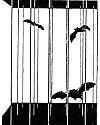|
This
uncanny "blind flying" ability has, from time to time,
aroused a lot of speculation on the part of scientists. Comparatively
recently, as I mentioned, two men at Harvard found what they believe to
be the answer. Instead of theorizing thev decided to try a few simple
experiments.
 The two men, Dr. [Robert] Galambos
and Dr. [Donald] Griffin, picked
out a
sound-proof room for their experiments and suspended from floor to
ceiling a straight row of steel wires spaced one foot apart. Bats were
set free in the room and they flew about, rarely touching the wires.
The two men, Dr. [Robert] Galambos
and Dr. [Donald] Griffin, picked
out a
sound-proof room for their experiments and suspended from floor to
ceiling a straight row of steel wires spaced one foot apart. Bats were
set free in the room and they flew about, rarely touching the wires.Then they were blindfolded and this did not seem to make much difference, in fact, some of the bats did better blindfolded. But the next step indicated the bats' secret. Their ears were plugged and their eyes were left uncovered. It was very difficult now to make them fly but when they did they collided consistently with the wires. And the same thing happened when a thread was tied around their mouths and their eyes were uncovered and the ears unplugged. Apparently the bat steered by sounds from its mouth which were picked up by his ears - the eyes had little or nothing to do with it. |








